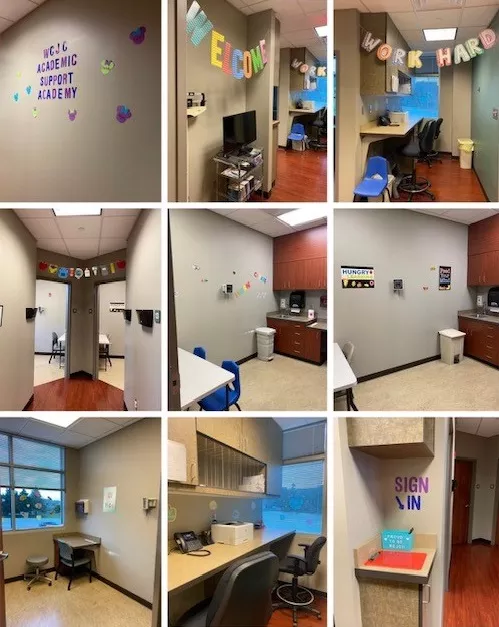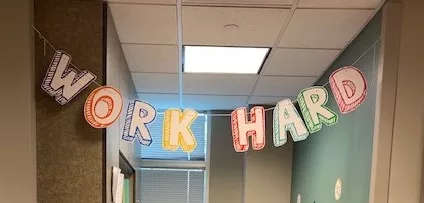
At Greenway, we want to celebrate the achievements of the incredible healthcare practices we serve. In this second installment of our “Greenway client heroes” series, we highlight additional ways Greenway clients are making a difference.
The COVID-19 crisis has challenged practices to adapt in new ways — from implementing telehealth to incorporating social distancing practices in waiting rooms to keeping up with changing payer guidelines for reimbursement.
For Women’s Clinic of Johnson County (WCJC), a Kansas-based division of Mid America Physician Services, LLC, the challenge of staffing resulted in an extraordinary solution. As schools announced plans to go online for the 2020 fall semester, parents faced the possibility of having to leave their jobs to care for their children.
“A lot of single moms were expressing that ‘my daycare is not going to do after-school care anymore, and I only have childcare until 3’ or ‘my elderly parents were watching my kids over the summer and now they can’t,’” said Michele Newbanks, EMR Specialist/Administrative Assistant.
In addition, Michele said she had conversations with employees who faced similar circumstances.
At the beginning of the pandemic, the physicians and manager at WCJC met every Sunday to strategize about how to keep staff safe while continuing to care for patients. The group committed not to lay off any staff, even voting to withhold physician paychecks in case funds were needed to cover staff paychecks during the six-week stay-at-home order in effect in the region.
“Many of our staff are single mothers, and several became the sole bread winners when their husbands were laid off,” said Colette Belcher, Administrator.
Understanding the challenge of finding full-time childcare, the group was determined to find a way for staff to come to work.
"Working in healthcare is hard, but working in healthcare while schools went remote was even harder.”Michele Newbanks, EMR Specialist/Administrative Assistant, Women’s Clinic of Johnson County
‘School in an OB-GYN office’
Colette, Michele, and the practice’s CEO Dr. Amanda Healy began to research the possibility of converting a pod of exam rooms into classrooms where staff children could participate in virtual classes.
Their first step was to call the Johnson County Department of Health and Environment and determine which rules and regulations would apply. Since parents remained on-site, the practice did not have to be licensed as a daycare. Instead, WCJC obtained Alternative Care Facility certification.
“We weren’t able to just Google ‘how to set up tutoring in a doctor’s office,’ so we just started looking at after-school programs and how they did things,” Colette said.
They collected enrollment forms, consent forms, and health history forms. They hired two full-time tutors with previous childcare experience and got to work transforming six exam rooms, replacing exam beds with tables and whiteboards. They decorated the rooms to make them feel like a school. The WCJC Academic Success Academy was born.
“You wouldn’t have known it wasn’t a school,” Colette said. “We did first day of school pictures just to try to normalize it. I think Dr. Healy made a joke that ‘They’re going to tell their grandkids that they went to school in an OB-GYN office!’”
A day at ‘school’
The WCJC Academic Success Academy started the fall school semester with 25 students, ranging from kindergarten to sixth grade, from seven school districts. The roster included Michele’s fourth-grade son.
“I would come 15 minutes before work started and bring him in,” Michele said. “And they would get his temperature. I would take him to his little classroom — exam room — and get his stuff out and get him logged into Zoom.”
At lunchtime, Michele would join her son for lunch, and then return to work while he completed his next set of Zoom classes.
Parents provided the tutors with their child’s class schedule, as well as school district-approved devices to participate in classes. The tutor used a whiteboard to keep track of when students started their online learning classes and when they could take lunch or recess.
Since most staff work until 5 p.m., while a typical school day ends at 4 p.m., the tutors would have the children play games, make crafts, and occasionally watch a movie after school hours.
The practice didn’t charge parents for the childcare provided. Instead, it asked parents to spend 30 minutes each day giving hands-on help to the tutors and interacting with their child. Staff remained clocked in during this time and were still compensated for working in the practice.
“Working in healthcare is hard, but working in healthcare while schools went remote was even harder,” Michele said. “We were blessed our physicians provided this at no cost to us.”
Ensuring the well-being of staff and patients
If not for the academy, WCJC estimates that at least 50% of its staff would have been unable to work during the fall school season due to lack of childcare options. The academy made it possible for 18 employees — including nine of the practice’s 12 medical assistants — to continue to come to work and serve patients. Because of the academy, the practice maintained its full patient volume, an average of 228 patients a day, from September through December.
By the end of October, as some school districts transitioned back to in-person or hybrid learning, 15 students still attended the academy, even if just for a couple days a week. When schools returned to fully in-person, the academy closed.
“Our whole approach to COVID was how do we take great care of our patients and how do we keep our staff safe,” Dr. Healy said. “Those were our main priorities from the beginning.”
More clients doing good: ensuring access to care
Extraordinary times call for extraordinary solutions, and healthcare heroes have gone above and beyond to get patients the care they need.
Angelica Sanchez, IT/EMR Specialist at Kenosha Community Health Center, Inc. shared how the FQHC clinic implemented telehealth across its medical, dental, and behavioral health departments.
Telehealth was critical to caring for patients during a difficult time for the community.
“We found ways to still provide patient care during riots in Kenosha, Wisconsin, despite being located in the center of where riots took place.”Angelica Sanchez, IT/EMR Specialist at Kenosha Community Health Center, Inc
“We found ways to still provide patient care during riots in Kenosha, Wisconsin, despite being located in the center of where riots took place,” Angelica said.
Terry Coleman, Practice Administrator at Charleston Internal Medicine in Charleston, W.Va., said her practice pivoted to reach patients where they are — by rolling out home visits to keep patients safe while still maintaining a close connection to address their care needs.
“We would pick up any meds the patient needed at their pharmacy and also stop by the grocery store for them,” Terry said.
Orthopaedic Center of Venice, PL in Venice, Fla., deferred medical payments to ensure that, even if patients had lost income amid the pandemic, they could still receive care.
COVID-19 testing, vaccines, and community support
As care delivery has changed shape, COVID testing procedures and vaccine administration have followed suit. These Greenway clients have gone the extra mile to serve their communities:
- Family Health Center of Southern Oklahoma conducted COVID vaccination drives.
- Stigler Health & Wellness Center, Inc., also in Oklahoma, partnered with local colleges to facilitate COVID screenings during dorm move-in, as well as to provide care kits with items such as masks and hand sanitizer to incoming students.
- Kenosha Community Health Center turned its dental mobile unit into a medical mobile unit for COVID testing and plans to provide vaccines soon.
- Glenwood Medical Associates, P.C. in Colorado offers both the active virus and antibody tests not just to patients, but to others in the area as well. It has partnered with local organizations and set up protocols so both tests are available to the entire community. “We feel it is important for the members of our community, and not just our patients,” said Ivy Davis, Quality Manager.
- Obstetrics & Gynecology Specialists, P.C. in Iowa collaborated with a local high school organization to provide toothbrushes, toothpaste, deodorant, feminine products, and other hygienic items to young women.
- Waubonsie Mental Health Center in Iowa was flooded with patients in need of help due to the pandemic. The practice worked to connect patients with resources, such as food and fans.
Greenway is humbled and proud to support the work of these exemplary healthcare heroes and clients.




